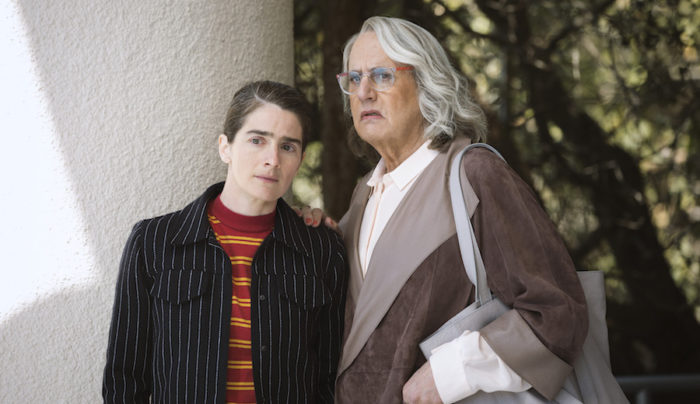Amazon UK TV review: Transparent Season 4
Review Overview
Subplots
6Secrets
8Strength
10David Farnor | On 24, Sep 2017
This is a spoiler-free review based on all episodes of Season 4.
“Maybe it runs in the family.” “Maybe it’s like dyslexia.” “It’s not like dyslexia.”
Transparent has always been a show that specialises in frank, funny debate – debate made all the more honest and amusing by the fact that it occurs between family members. Ever since Maura’s coming out, that spark of truth has prompted a wave of revelations throughout the Pfeffermans, ones that go back into their past and raise questions about their future. After Season 2 expanded its scope to consider family history dating back to the war and Season 3 delved into their religious faith, Season 4 builds upon both by taking the whole clan to Israel.
It’s the kind of premise that sounds straight from a Carry On… film or an EastEnders holiday special, but Transparent’s success lies in its ability to blend laughs and soapy confrontations with a deep, profound exploration of serious issues. The Israel/Palestine conflict? Showrunner Jill Soloway doesn’t shy away from tackling something so big, and manages to do so with mixed, but rewarding, results.
There is, of course, the tourist montage you expect, as the group visit all the major landmarks you’ve heard of, from the Wailing Wall to the Dead Sea, but before that, there’s the small matter of getting through the airport to consider. Maura, invited to speak at a conference as a respected professor, finds herself held up at security, as they try to examine her suspicious “groin anomaly”. Accompanied by the ever-loyal Ali (Gaby Hoffman), the resulting showdown is painfully intimate and hilariously awkward – exactly the kind of sweet-spot that Transparent can now hit effortlessly. The situation even goes viral, thanks to Ali filming it all on a smartphone – proof that the show is well aware of when it’s getting something right.
It’s a shame, then, that this season, which is almost a standalone outing and feels so carefully rounded, is also the show’s sloppiest to date. That’s not to say it’s bad: compared to the impossibly high standards of what’s gone before, this is still gourmet television, just with a couple of spillages around the plate.
By now, Maura’s transition has almost become routine, as the show increasingly focuses on new complexities and confusions in the family members surrounding her. Josh (Jay Duplass) has had to deal with the suicide of the former babysitter who molested him as a child; Sarah (Amy Landecker) has come to terms with the urges pulling her away from, and back to, her sort-of husband, Len (Rob Huebel); Shelly, of course, has “transitioned” into a brand; and Ali is still going through a similar existential confusion to the one that plagued Maura for so long.
While each narrative vein has been rich in character details and emotional nuance, there’s a sense here that some of them are being opened up almost for the sake of it, to make sure that there’s enough substance to fill up the runtime. And if there’s one thing Transparent doesn’t require more of, it’s substance.
In some cases, additions are welcome. Sarah and Len’s subplot, which has occasionally felt superfluous in the past, reaches a new emotional level in this season, primarily thanks to the introduction of a new player: Lila (Alia Shawkat), a younger woman whom Sarah meets at a sex addicts meeting. In fact, that’s where the show chooses to open: with a group therapy session for people who are addicted to sex. Is it the pleasure that drives Sarah, the feeling of physical connection, or the notion of someone else depending upon her? Landecker’s superb performance allows room for a multitude of motivations, with Huebel’s Len coming into his own as a patient, supportive partner who is willing to try anything. Shawkat, who has blossomed with the chance finally to have a lead role in Search Party, is typically excellent, and bravely candid, in her exposed role, while the show manages to mine the trio’s heated interactions for both genuine affection and laugh-out-loud humour – exactly as you’d expect for a programme that is willing to embrace new possibilities and treat them sincerely.
The decision to go to a sex addicts meeting also resonates with Josh, after one group member speaks about the importance of consent for men too. Hallucinations of his former babysitter, and their subsequent conversations, are sometimes too on-the-nose to convince, but Duplass, who has not traditionally been someone in front of a camera, gets better and better with each season, and his awkward vulnerability is as heartbreaking as his resilience is encouraging.
It’s a shame, then, that his screen-time also revolves around this season’s weakest strand: Shelly. Judith Light was a delight in Season 3, as she built up to a one-woman show that let her steal back the spotlight in her own life. Now, the question is where she can go from there, and Transparent doesn’t always have the answer: she moves in with Josh, primarily so that they can be in initial conflict with each other, as her overbearing personality intrudes on his space. Then, she starts to try improv comedy, a vignette that isn’t without laughs (“But how do you know it’s gonna be good?” she asks, breaking character mid-sketch) but feels overly familiar. By the time she, Josh and the others have flown out to Israel too, a conversation packed with major reveals almost seems contrived to bump up the drama – an unusual feeling in a programme that’s so affectingly sincere. The strengthening bond between her and Josh, though, makes up for the narrative slip through its sheer emotional consequences – both Shelly and Josh are side characters in Maura’s tale, but they learn to relate to each other as survivors of their own stories. (A single shot of Josh carrying his mum into the Dead Sea is enough to atone for any screenplay stumbles before and after.)
Ali, as if often the case, has the richest storyline of all, as she spends her time in Israel largely in the West Bank, where she meets up with an old friend and comes into contact with a young, politically minded, fashionable group who are keen not to rely on Israel for a living. Essentially a hipster Palestinian community, it’s the perfect fit for Transparent, as it allows the show to combine its open-minded stance on personal issues with a similar, neutral pose on international politics, while still trying to tease out the nuances and overlaps on each side of the divisive, long-running dispute.
There’s a wonderful way in which Transparent manages to think wider and ask questions about national identity, while also examining the way in which these characters are affected by such issues: naturally, this privileged clan have a habit of making things all about themselves, and it’s inevitable that Ali’s character should jump straight onto the band wagon and self-righteously support Palestine, even as she leaves the rest of the Pfeffermans behind on the tourist trap route. Maura, on the other hand, is mostly concerned with keeping things calm and civil – there’s a gentle thematic through-line (which is, to the show’s credit, largely unspoken) about how people of all ages and backgrounds are all trying to find some form of peace, whether that’s through the revered respect shown by the family to their Jewish faith and culture or the questions about gender and identity that take on more serious stakes in the middle of a national split.
It’s a delight, therefore, to see the show still carve out room for Alexandra Billings as Davina, who gets practically her own episode to reveal and dissect her own backstory – Billings, who is increasingly finding work in other shows, is excellent as the confident-in-her-own-skin woman, and it says a lot that the series could have ignored her altogether, but instead chooses to spend time with her, just because it wants to. (The Pfeffermans are the stars of the show, but Jill Soloway and her writers are never so enamoured that they can’t criticise their protagonists or look elsewhere.)
And what of Maura? Jeffrey Tambor’s turn remains brilliant, as she faces a new challenge to her sense of identity, just as she starts to be comfortable in her own skin. Deciding not to have surgery, partly because she wasn’t able to, was a big step in Season 3 for her, but has also opened a whole new aspect of transition for the programme to consider – this is a show that deftly manages to use different age groups to compare and contrast the way that people talk about transgender issues, from Maura and a prospective new boyfriend down to Ali and Sarah, and Maura’s non-surgical transition is the kind of assumption-bucking move that only adds more depth to the mix.
Ali and Maura have become perfect partners for the show to frame that conversation through, both recognising in each other a feeling of not quite belonging. There’s a parallel (again, not laboured) between the Pfefferman’s religious heritage, which brings with it trauma dating back decades, and their personal baggage: the notion that family members both older and younger could all be going through the same kind of dilemmas is a moving one, and Season 4 uses the idea of a homecoming to Israel to climb further up the family tree to consider Maura’s own parents. Flashbacks continue to pepper the action, giving us fresh glimpses of things that influenced Maura when young, but there’s also a strong questioning of what it’s like for her older relations – even the corny jingle of an air conditioning advert on TV can prompt the return of memories and figures forgotten in a fresh new light, and Tambor and Hoffman face them with a stirring desire for closure, regardless of whether it’s positive or negative.
There are also flashes of our characters as children, as brief visions of the adults played by kids interrupt scenes without changing the conversation – a surreal gag that reinforces the theme of generational divide and maturity. Do the Pfeffermans all carry the urge to transition like dyslexia? No, but regardless of age, they’re all questioning their own identities, and they all inherit secrets and pass them down, just as they all revel in spilling other people’s secrets during moments of cathartic candour. That sense of breaking down those hushed boundaries is what keeps Transparent as weighty and satisfying as ever, even during its weaker episodes. It’s a show that celebrates loving, supporting relationships in any guise they take, and, as part of that intimacy, delights in truth and sincerity.
Throughout, music from Andrew Lloyd Webber’s Jesus Christ Superstar plays in the background, smartly combining religion and secularism with the show’s message of resilience and responsibility for future generations. “Always hoped that I’d be an apostle/Knew that I would make it if I tried,” intones The Last Supper. “Then when we retire, we can write the Gospels/So they’ll still talk about us when we’ve died.” In one standout moment, Maura and the others sit around a table, as they casually sing together “Everything’s Alright”. Mary Magdalene’s infectiously reassuring ditty, which is heard over the credits earlier, emerges as an upbeat statement of union and affirmation. That strength really does run in the family. Long may it continue.
Transparent Season 4 is available exclusively on Amazon Prime Video UK. Season 1 to 3 are already available to stream. Amazon Prime Video costs £5.99 a month – or, for free next-day delivery on products from Amazon as well, £79 a year for a full Amazon Prime membership.
For more on Transparent, see our interview with Jill Soloway and Jeffrey Tambor from last year – or read our reviews of Season 1 to 3.























